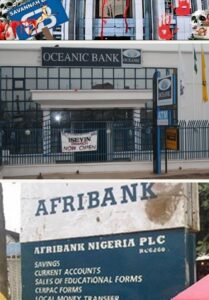7 Nigerian Banks That No Longer Exist – And Why They Failed
7 Nigerian Banks That No Longer Exist – And Why They Failed

Nigeria’s financial sector has undergone significant changes over the years, with many institutions thriving while others quietly faded into history. Today’s banking landscape is dominated by giants like Zenith Bank, GTBank, and Access Bank. However, not all banks that once held sway survived the waves of reforms, regulations, and economic shifts that have shaped the industry.
Some banks were shuttered due to mismanagement, others failed to meet recapitalization requirements, and a few were victims of outright fraud or poor governance. Below are seven Nigerian banks that once played prominent roles in the country’s banking history but eventually ceased to exist—and the reasons behind their collapse.
—
1. Savannah Bank
Once one of the most recognized names in Nigerian banking, Savannah Bank operated over 140 branches nationwide. However, in 2002, the Central Bank of Nigeria (CBN) revoked its license, citing a weak capital base and persistent regulatory breaches. Allegations of mismanagement further damaged its reputation.
Despite winning a court case in 2009 that led to the restoration of its license, the bank has yet to resume full operations.
—
2. Societe Generale Bank of Nigeria (SGBN)
Founded by the Saraki family, SGBN was once respected for its innovation and community-focused services. It was, however, unable to meet the ₦25 billion minimum capital requirement introduced during the 2005 banking consolidation exercise. As a result, it was shut down in 2006.
The institution later resurfaced as Heritage Bank in 2012, after acquiring a license through Enterprise Bank.
—
3. Oceanic Bank
Oceanic Bank was a major player in both retail and corporate banking, with widespread reach across Nigeria. Its downfall came in the aftermath of the 2008–2009 global financial crisis.
A CBN audit exposed massive insider loans and poor corporate governance. The then-CEO, Cecilia Ibru, faced prosecution and was convicted in a widely publicized case. In 2011, the bank was absorbed by Ecobank.
—
4. Bank PHB (Platinum Habib Bank)
Created during the 2005 consolidation, Bank PHB rapidly grew to become one of Nigeria’s top banks. Known for its bold marketing and strong brand, its internal structure told a different story.
In 2011, the CBN withdrew its license after it failed to recapitalize and was found guilty of unsound financial practices. A bridge bank—Keystone Bank—was created to take over its operations and continues to serve customers today.
—
5. Spring Bank
Spring Bank emerged from the merger of six smaller banks during the 2005 reform period. Unfortunately, the new entity struggled from the beginning due to poor management and ongoing liquidity problems.
Its inability to recapitalize and meet CBN’s requirements led to the revocation of its license in 2011. Enterprise Bank took over its operations before eventually merging into Heritage Bank.
—
6. Afribank
Founded in 1959, Afribank was one of Nigeria’s oldest and most iconic financial institutions. However, it struggled to adapt during the banking reforms of the early 2010s.
When the CBN reviewed the financial health of banks in 2011, Afribank was declared insolvent. A new institution, Mainstreet Bank, was created to assume its assets and liabilities. Mainstreet was later acquired by Skye Bank.
—
7. Allstates Trust Bank
Allstates Trust Bank failed to survive the 2005 recapitalization policy that raised the minimum capital base from ₦2 billion to ₦25 billion. Without a successful merger or adequate investor support, the bank couldn’t meet regulatory requirements.
Due to compliance issues and weak capitalization, its license was revoked and it was officially shut down.
—
Why These Banks Collapsed
The failures of these banks were largely driven by systemic issues such as:
Weak corporate governance
Insider abuse and fraud
Inability to meet capital adequacy benchmarks
Poor compliance with regulatory guidelines
The Central Bank, especially under the leadership of former Governor Sanusi Lamido Sanusi, implemented reforms aimed at sanitizing the sector. This included aggressive enforcement of recapitalization, audits, and in some cases, criminal prosecutions.
These closures, while painful, paved
the way for a more stable, transparent, and competitive banking environment in Nigeria.
TRENDING SONGS
 Shock in Anambra: Bride Disappears Moments Before Wedding
Shock in Anambra: Bride Disappears Moments Before Wedding
 Nigerian Woman Returns ₦330 Million Accidentally Credited to Her Account
Nigerian Woman Returns ₦330 Million Accidentally Credited to Her Account
 APC Don Reach Morocco?’ VeryDarkMan Reacts to Seyi Tinubu Poster
APC Don Reach Morocco?’ VeryDarkMan Reacts to Seyi Tinubu Poster
 Bride Breaks Down in Tears as Wedding Meals Were Kept Secretly While Guests Go Home Hungry
Bride Breaks Down in Tears as Wedding Meals Were Kept Secretly While Guests Go Home Hungry
 Odogwu by Day, Robber by Night: How Marriage Joy Turned Into Tragedy
Odogwu by Day, Robber by Night: How Marriage Joy Turned Into Tragedy
 Nigerian Officials Allegedly Pocket N4–6B Weekly Through Smuggling Cartels at Seme–Badagry Border
Nigerian Officials Allegedly Pocket N4–6B Weekly Through Smuggling Cartels at Seme–Badagry Border
 Ahmad Yerima: Naval Officer to Face No Sanctions After Clash with Wike – Matawalle
Ahmad Yerima: Naval Officer to Face No Sanctions After Clash with Wike – Matawalle
 Trending Video: Muslim Man Joins Wife in Hallelujah Challenge ‘Dress Like Your Miracle’ Night
Trending Video: Muslim Man Joins Wife in Hallelujah Challenge ‘Dress Like Your Miracle’ Night
 Woman Seeks Advice as Late Brother’s Wife Refuses to Mourn Him Following His Death With Alleged Mistress
Woman Seeks Advice as Late Brother’s Wife Refuses to Mourn Him Following His Death With Alleged Mistress
 Nobody Cares About Fine Girls In The UK, I Miss Nigeria — Nigerian Lady Laments
Nobody Cares About Fine Girls In The UK, I Miss Nigeria — Nigerian Lady Laments
Share this post with your friends on ![]()













